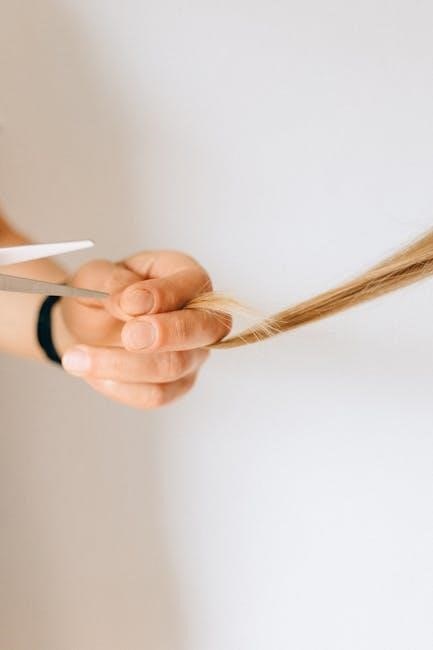
Granite care and maintenance are essential to protect your investment and ensure longevity․ Proper cleaning, sealing, and daily routines preserve its beauty and durability for years․
Why Granite is a Popular Choice for Countertops
Granite is a top choice for countertops due to its exceptional durability and timeless beauty․ It resists heat, scratches, and spills effectively, making it ideal for busy kitchens․ Its natural elegance enhances any interior, offering a wide range of colors and patterns to suit diverse styles․ Unlike other materials, granite is low maintenance when properly sealed, ensuring longevity with minimal effort․ Its ability to withstand high temperatures and heavy use makes it a practical option for homeowners․ Additionally, granite’s unique appearance adds a luxurious touch, increasing a home’s value․ These qualities combine to make granite a favored material for countertops, blending functionality and aesthetics seamlessly․
Importance of Proper Care and Maintenance
Proper care and maintenance are crucial to protect your granite investment and ensure its longevity․ Regular sealing, typically every 6 to 12 months, prevents stains and damage from spills․ Using neutral pH cleaning solutions and avoiding harsh chemicals is essential to maintain the surface’s integrity․ Daily cleanups with mild dish soap and water help prevent stains and etching․ Neglecting maintenance can lead to irreversible damage, such as deep stains or discoloration․ By following care routines, you can preserve granite’s natural beauty and durability, ensuring it remains a stunning and functional part of your home for years to come․ Consistent effort keeps granite countertops looking like new․
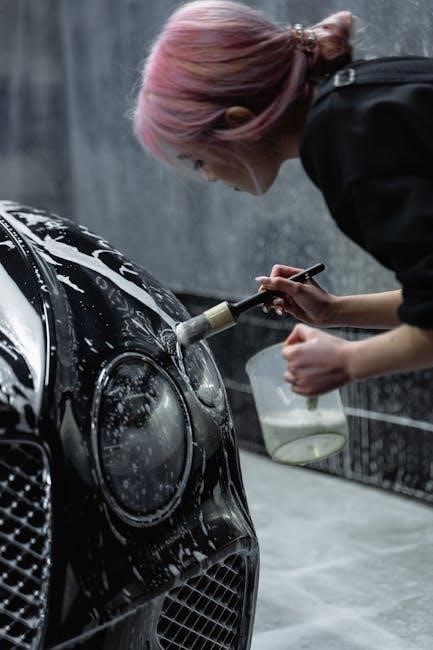
Daily Care and Use
Clean your granite countertops daily with a soft cloth and mild dish soap․ Use neutral pH solutions to avoid damage․ Wipe spills immediately to prevent stains․
Cleaning Your Granite Countertops
Cleaning granite countertops is straightforward when done correctly․ Use a soft, clean cloth and mild dish soap mixed with warm water for daily maintenance․ Avoid harsh chemicals, abrasive cleaners, or acidic substances like vinegar or bleach, as they can damage the surface or strip away the sealant․ For tougher spills, use a neutral pH granite cleaner specifically designed for natural stone․ Always blot spills gently rather than rubbing to prevent scratching․ Microfiber cloths are ideal for cleaning granite due to their gentle yet effective texture․ Regular cleaning prevents dirt buildup and maintains the stone’s polished appearance․ Consistency is key to preserving the beauty and longevity of your granite countertops․
Immediate Spill Cleanup
Immediate action is crucial for preventing stains on granite countertops․ Upon a spill, act quickly to blot the area with a clean, absorbent cloth or paper towel․ Avoid rubbing, as it may spread the spill or scratch the surface․ For oil-based or acidic spills, such as wine or tomato sauce, neutralize the area with a mixture of baking soda and water, forming a paste․ Apply the paste, let it sit for 30 minutes, then rinse with warm water and dry thoroughly․ Prompt cleanup prevents substances from penetrating the granite’s surface and causing stubborn stains․ Regular sealing enhances resistance, but immediate attention remains vital for maintaining the countertop’s appearance and longevity․
Drying and Preventing Water Spots
Drying your granite countertops thoroughly after cleaning or exposure to water is essential to prevent water spots․ Use a microfiber cloth to gently blot the surface, as rubbing can create streaks․ Avoid using abrasive materials or harsh chemicals, as they can damage the sealant or etch the stone․ Regular sealing helps repel water and reduces the risk of spots․ For stubborn water spots, apply a small amount of granite polish or a mixture of baking soda and water, let it sit, then buff with a clean cloth․ Preventative care, such as drying immediately after spills and using coasters, ensures your granite remains spot-free and maintains its polished appearance for years․
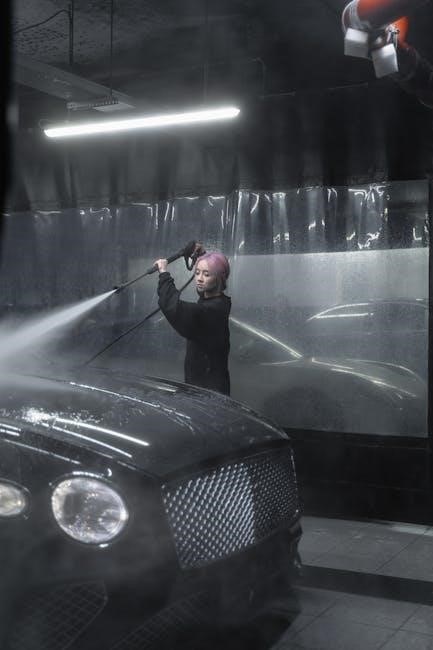
Cleaning Products for Granite
Use neutral pH cleaners or mild dish soap solutions to safely clean granite․ Avoid acidic or abrasive products, as they can damage the surface or sealant․
Recommended Cleaning Solutions
For daily cleaning, use a mild dish soap mixed with warm water or a neutral pH cleaner specifically designed for natural stone․ These solutions effectively remove dirt and spills without damaging the granite or its sealant․ Avoid acidic or abrasive products, as they can etch or dull the surface․ Microfiber cloths or soft sponges are ideal for cleaning, as they won’t scratch the granite․ For tougher stains, consider using granite-specific cleaners that often contain sealers to enhance protection․ Always rinse thoroughly and dry the surface to prevent water spots․ Regular use of these recommended solutions ensures your granite remains clean, protected, and maintains its luxurious appearance over time․
What to Avoid in Cleaning Products
When cleaning granite, it’s crucial to avoid harsh chemicals, acidic substances, and abrasive cleaners․ Products containing ammonia, bleach, or vinegar can etch or discolor the surface․ Avoid using alkaline cleaners, as they may damage the sealant․ Never use abrasive scrubbers or powders, as they can scratch the granite․ Acidic foods like citrus or tomatoes, if left on the surface, can also cause damage․ Harsh chemicals like bathroom or grout cleaners are too strong and may weaken the stone over time․ Always opt for neutral pH cleaners or products specifically designed for natural stone to maintain the integrity and appearance of your granite countertops․
Homemade Cleaning Solutions
For a cost-effective and safe cleaning method, consider homemade solutions․ A mixture of mild dish soap and warm water is ideal for daily cleaning․ Dilute the soap in water, dip a microfiber cloth, and wipe the surface gently․ For tougher stains, a solution of equal parts white vinegar and water can be used, but avoid overuse as vinegar is slightly acidic․ Always rinse thoroughly with clean water and dry with a microfiber cloth to prevent water spots․ Avoid using harsh chemicals or abrasive scrubbers, as they can damage the granite or its sealant․ Homemade solutions are eco-friendly and maintain the natural beauty of your countertops without exposing them to harmful substances․
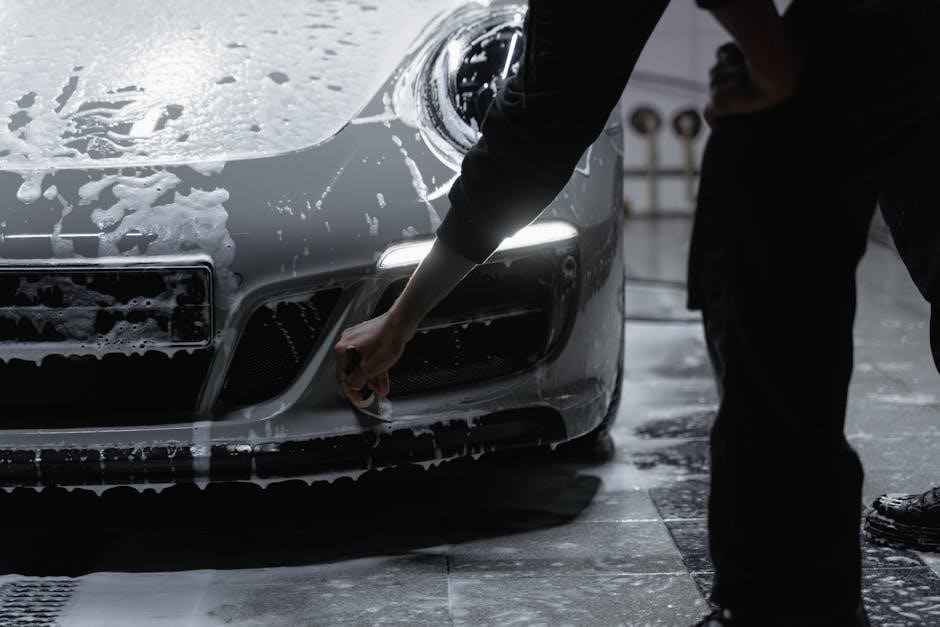
Sealing Granite Countertops
Sealing granite countertops is essential to protect them from stains and spills․ It should be done every 6 to 12 months using a granite-specific sealer․ Apply the sealer evenly, let it dry, and wipe off any excess with a clean cloth․ This simple process ensures your countertops remain durable and maintain their appearance․
Why Sealing is Necessary
Sealing is crucial for granite countertops as it protects them from stains and spills․ Granite is a porous material, making it susceptible to damage from oil, water, and acidic substances․ Without sealing, these liquids can penetrate the surface, causing discoloration and weakening the stone․ Sealing creates a barrier, preventing such damage and making cleanup easier․ Regular sealing also preserves the granite’s original appearance, ensuring it remains vibrant and durable over time․ This protective layer is especially important in high-traffic areas like kitchens, where exposure to various substances is frequent․ Proper sealing enhances the longevity and aesthetic appeal of your granite countertops;
How Often to Seal Granite
Granite should be sealed every 6 to 12 months to maintain its protective barrier․ The frequency depends on usage and exposure to liquids․ High-traffic areas or kitchens may require sealing more often, while low-use surfaces can go longer between treatments․ Testing the surface by dripping water on it can determine if sealing is needed; if the water beads, the seal is still effective․ If it absorbs quickly, resealing is necessary․ Consistent sealing ensures the granite remains resistant to stains and spills, preserving its durability and appearance․ Regular maintenance with the right products guarantees a lifetime of beauty for your countertops․
Signs Your Granite Needs Sealing
Several signs indicate when your granite needs sealing․ If water no longer beads on the surface but instead absorbs quickly, it’s time to reseal․ Stains or discoloration appearing more easily also signal the need for sealing․ Additionally, if the granite appears dull or lacks its usual luster, the seal may be worn․ Regular exposure to moisture or heavy use can also reduce the effectiveness of the seal․ Finally, if cleaning becomes more difficult due to dirt sticking to the surface, sealing is likely overdue․ Addressing these signs promptly ensures your granite remains protected and maintains its aesthetic appeal․
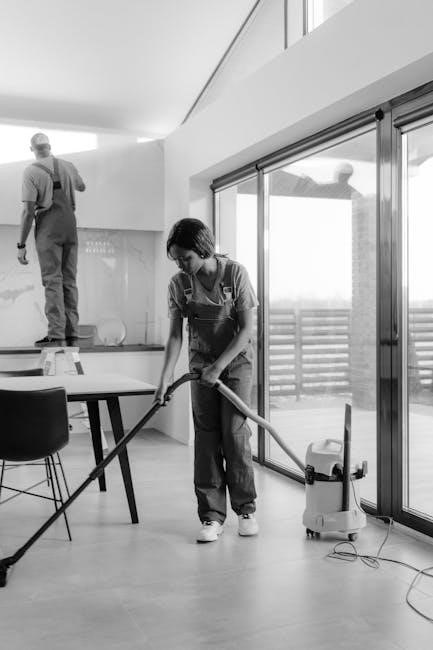
Deep Cleaning and Stain Removal
Deep cleaning granite involves addressing stubborn stains and grout lines․ Use a poultice or hydrogen peroxide to lift stains․ Regular deep cleaning prevents damage and maintains shine․
Removing Stains from Granite
Removing stains from granite requires prompt action and the right techniques․ For oil-based stains, use a poultice with a solvent like mineral spirits․ Water-based stains can be treated with hydrogen peroxide․ Apply the poultice, cover with plastic, and let it sit for 24-48 hours․ Repeat if needed․ For ink stains, apply bleach or hydrogen peroxide directly․ Avoid abrasive cleaners or harsh chemicals, as they can damage the surface․ Regular sealing helps prevent stains from penetrating deeply․ Always test a small area first to ensure the cleaning solution doesn’t harm the granite․ With proper care, most stains can be effectively removed, restoring your granite’s original beauty․
Using Poultice for Tough Stains
A poultice is a highly effective method for removing tough stains from granite․ Mix a cleaning solution, such as hydrogen peroxide or a solvent, with an absorbent material like talc or diatomaceous earth to form a paste․ Apply the poultice evenly over the stain, ensuring full coverage․ Cover with plastic wrap and let sit for 24-48 hours, allowing it to draw out the stain․ After removing the poultice, rinse with warm water and dry thoroughly․ Repeat if necessary․ This technique is gentle on the granite surface while deeply penetrating to lift stubborn stains․ Always test a small area first to ensure no discoloration occurs․
Maintenance Tips
- Regularly rinse and dry granite surfaces to prevent water spots and mineral deposits․
- Use a soft cloth to wipe down countertops after meals to avoid crumbs and spills settling․
- Avoid using harsh chemicals or abrasive cleaners that can damage the sealant or stone․
Regular Rinsing and Drying
Regular rinsing and drying are crucial for maintaining granite countertops․ After each use, wipe down the surface with a clean, damp cloth to remove any residue or spills․ For tougher spots, mix a small amount of mild dish soap with warm water and gently scrub the area․ Always dry the granite thoroughly with a soft, lint-free towel or microfiber cloth to prevent water spots from forming․ This simple routine helps maintain the stone’s appearance and prevents mineral deposits from building up over time․ Consistency in this practice ensures your granite remains pristine and durable for years to come․
Preventing Soap Scum Buildup
Granite tends to attract soap scum, which can dull its appearance over time․ To prevent buildup, rinse the surface thoroughly with hot, clean water after each use, especially in areas around sinks․ Regularly drying the countertop with a paper towel or microfiber cloth is essential to avoid mineral deposits․ For stubborn soap scum or lime buildup, gently scrape the area with a straight razor blade in a smooth, even motion․ Avoid using harsh chemicals like ammonia or lime removal products, as they can damage the stone․ Consistent rinsing and drying routines, along with occasional gentle scraping, will help maintain your granite’s clarity and prevent soap scum from accumulating․
Gentle Scrape for Dried Spills
For dried spills on granite, a gentle scraping method is effective․ Use a straight razor blade or a dull utility knife to carefully remove the dried residue․ Hold the blade at a shallow angle and scrape in a smooth, consistent motion to avoid scratching the surface․ Avoid applying too much pressure, as this could damage the granite․ After scraping, clean the area with a neutral pH cleaner and dry it thoroughly with a microfiber cloth․ Regular scraping prevents spills from becoming stubborn stains․ This method is particularly useful for food spills or adhesive residue, ensuring your granite remains pristine and free of blemishes․
Advanced Maintenance
Advanced maintenance for granite involves specialized techniques to preserve its elegance․ This includes polishing edges for a refined appearance and maintaining seams for a cohesive look․
Polishing Granite Edges
Polishing granite edges enhances their appearance and prevents chipping․ Use a diamond-edged polishing pad or a granite-specific polish․ Apply the polish evenly, working in circular motions․ Rinse thoroughly with clean water to remove residue․ Regular polishing maintains the edges’ smoothness and luster․ Avoid using harsh chemicals or abrasive materials, as they can damage the surface․ For tougher stains or dull spots, consider professional polishing services․ Always test a small area first to ensure the product suits your granite type․ Polishing is a simple yet effective way to keep your countertops looking like new, ensuring long-lasting beauty and durability․
Maintaining Granite Seams
Maintaining granite seams is crucial for preserving the integrity and appearance of your countertops․ Granite seams are necessary joints where two pieces of stone meet, typically up to 1/8 inch wide․ To maintain them, regular cleaning is essential․ Use a mild detergent and water to wipe down the seams, ensuring no dirt or debris accumulates․ Avoid harsh chemicals or abrasive cleaners, as they can damage the adhesive or discolor the stone․ Inspect seams regularly for signs of wear or separation․ If damage occurs, consult a professional for repair․ Proper maintenance prevents gaps from widening and ensures a seamless look․ Regular sealing also helps protect the area around the seams from stains and moisture penetration․
Common Mistakes to Avoid
- Using harsh chemicals that damage the sealant․
- Exposing granite to high temperatures without trivets․
- Neglecting regular maintenance, leading to stains and damage․
Avoiding these mistakes ensures granite’s durability and aesthetic appeal․
Using Harsh Chemicals
Using harsh chemicals on granite countertops is a common mistake that can lead to damage․ Chemicals like bleach, ammonia, or acidic cleaners can strip the sealant, causing etching or discoloration․ These substances weaken the surface, making it more prone to stains and scratches․ Always avoid abrasive cleaners or strong detergents, as they can dull the granite’s finish․ Instead, opt for pH-neutral cleaners specifically designed for natural stone․ Reading product labels carefully ensures compatibility with granite․ Regular use of harsh chemicals can void warranties and reduce the countertop’s lifespan․ Protect your investment by choosing gentle, granite-safe cleaning products to maintain its beauty and durability for years to come․
Exposing Granite to High Temperatures
Exposing granite to high temperatures can cause damage, despite its natural durability․ Placing hot pans, appliances, or open flames directly on the surface can lead to thermal shock, resulting in cracks or discoloration․ While granite is heat-resistant, extreme or sudden temperature changes can weaken its structure over time․ To prevent damage, always use trivets, heat pads, or coasters under hot items․ This protective measure ensures the granite remains intact and maintains its aesthetic appeal․ Regular exposure to high heat can also degrade the sealant, making the surface more susceptible to stains․ Protecting your granite from excessive heat is essential for preserving its longevity and maintaining its luxurious appearance․
Neglecting Regular Maintenance
Neglecting regular maintenance can lead to premature wear and damage to granite surfaces․ Failing to clean spills promptly allows substances like oil and acid to penetrate deeply, causing stubborn stains․ Over time, dirt and grime can build up, dulling the granite’s polished finish․ Without proper sealing, the stone becomes more porous, making it vulnerable to stains and etching․ Regular rinsing and drying are essential to prevent water spots and mineral deposits․ Neglecting these steps can result in a worn, uneven appearance․ Consistent care ensures granite retains its beauty and durability, while neglect can lead to costly repairs and a shorter lifespan for the surface․
Specialized Granite Care Products
Specialized granite care products are designed to protect and enhance the stone’s natural beauty․ They often contain mild, pH-neutral formulas that clean without damaging the surface․
Recommended Brands for Granite Care
When it comes to granite care, using products from trusted brands ensures effectiveness and safety․ Stone Care International and Granite Gold are highly recommended for their specialized formulas․ Stone Care International offers a range of products, including sealers and cleaners, designed to protect and maintain granite surfaces․ Granite Gold is another top choice, known for its gentle yet effective cleaning solutions that preserve the stone’s natural beauty․ Both brands provide non-toxic, pH-neutral options that are safe for daily use and long-term maintenance․ These products are widely recognized for their ability to prevent stains and enhance the durability of granite countertops, making them a reliable choice for homeowners․
Using Multi-Purpose Granite Cleaners
Multi-purpose granite cleaners are an excellent choice for daily maintenance, offering convenience and versatility․ These cleaners are specifically formulated to handle various tasks, such as removing dirt, spills, and minor stains while maintaining the stone’s seal․ They are typically pH-neutral, ensuring they won’t damage the granite or its sealant․ When using these products, always follow the manufacturer’s instructions for dilution and application․ Avoid over-saturating the surface, as this can lead to residue buildup․ Regular use of multi-purpose cleaners helps prevent soap scum and keeps the granite looking pristine․ They are also eco-friendly and safe for families, making them a practical solution for keeping your countertops clean and well-maintained․ This approach ensures your granite remains durable and attractive for years to come․
Longevity of Granite Countertops
Granite countertops are renowned for their durability and longevity․ With proper care, they retain their elegant appearance for decades, making them a timeless choice for homes․
Ensuring a Lifetime of Beauty
To ensure your granite countertops retain their stunning appearance, consistency is key․ Regular cleaning with pH-neutral cleaners and prompt spill cleanup prevent stains and etching․ Sealing every 6-12 months creates a protective barrier against spills and daily wear․ Avoid harsh chemicals or abrasive materials that can damage the surface․ Daily maintenance, such as drying after cleaning, helps prevent water spots․ By adhering to these simple care routines, you can preserve the natural beauty and durability of your granite, ensuring it remains a breathtaking centerpiece in your home for generations․ Proper care transforms granite into a timeless, low-maintenance investment․
Granite’s Durability with Proper Care
Granite is renowned for its exceptional durability, but proper care enhances its resilience․ Regular sealing protects it from stains, while avoiding harsh chemicals and abrasive cleaners prevents surface damage․ Daily cleaning with mild soap and water maintains its polish and prevents grime buildup․ Promptly addressing spills, especially acidic or oily substances, ensures stains don’t set in․ By following these care practices, granite countertops remain resistant to scratches and heat, retaining their vibrant colors and glossy finish․ With consistent maintenance, granite’s natural strength and beauty endure, making it a lasting and elegant addition to any home․ Proper care not only preserves but also enhances granite’s durability․
Proper granite care ensures long-lasting beauty and durability․ Regular maintenance, prompt cleaning, and avoiding harsh products preserve its natural elegance, making it a timeless choice for homes․
Key Takeaways for Granite Care
To maintain your granite countertops, remember to clean daily with a soft cloth and neutral soap, and avoid harsh chemicals․ Regular sealing is crucial to protect the surface from stains and spills․ Always address spills immediately to prevent absorption, and use a poultice for tough stains․ Maintain a dry surface to avoid water spots and soap scum buildup․ Use recommended cleaning products and avoid abrasive materials or strong acids․ By following these simple steps, you can ensure your granite remains in pristine condition for years․ Proper care not only preserves its appearance but also enhances its durability and longevity․
Final Thoughts on Maintenance
Proper granite maintenance is a combination of daily care, regular cleaning, and periodic sealing․ By adopting these habits, you can ensure your countertops remain beautiful and durable․ Regular rinsing and drying prevent water spots, while gentle scraping removes dried spills․ Avoid harsh chemicals and abrasive cleaners to maintain the granite’s finish․ Sealing every 6-12 months protects against stains and extends the countertop’s lifespan․ Consistent effort ensures your granite surfaces stay pristine, providing a lifetime of functionality and aesthetic appeal․ Remember, preventive care is key to preserving your investment and enjoying the natural beauty of granite for years to come․